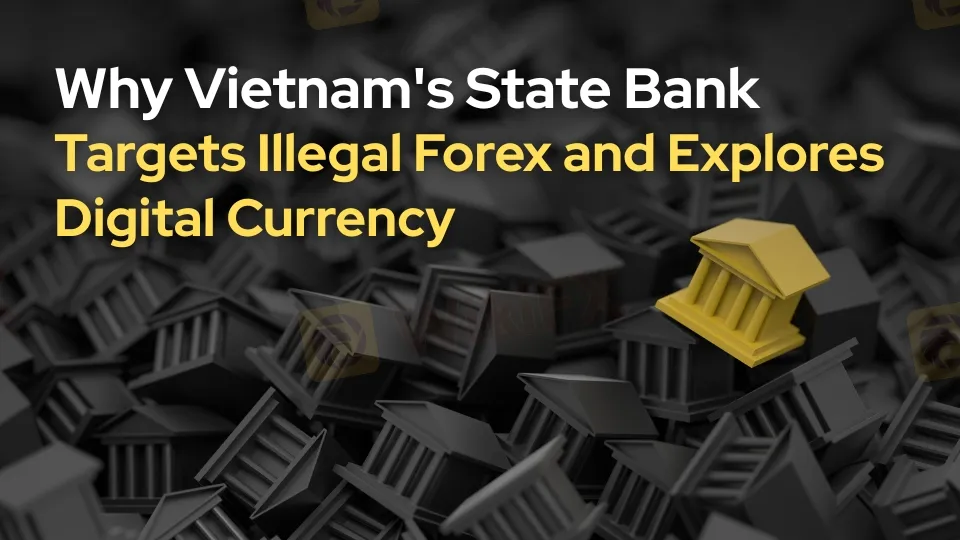Why Vietnam's State Bank Targets Illegal Forex and Explores Digital Currency
Abstract:Vietnam's State Bank takes action against illegal Forex trading while investigating the future of digital currencies, aiming for secure financial regulation.

The State Bank of Vietnam (NHNN) recently told the National Assembly that it hasn‘t issued licenses for any Forex exchanges in the country. This statement addresses mounting worries about the legality of Forex trading, which the bank says violates Vietnam’s foreign exchange rules.
In its latest report, NHNN made it clear that sending money overseas for Forex trading is strictly off-limits. This tough stance matters more than ever as scams tied to online Forex activities are on the rise, catching the attention of regulators and consumers alike.
To fight these scams, NHNN has been working closely with the Ministry of Public Security and police agencies, sharing key details about the legal framework for foreign exchange. This teamwork is meant to fuel investigations into shady Forex operations that exploit unsuspecting victims.
Most of these illegal Forex schemes operate online, making them tricky for authorities to pin down. To address this, NHNN has called for a joint effort involving agencies like the Ministry of Culture, Sports and Tourism, the Ministry of Public Security, and the Ministry of Industry and Trade. Together, they aim to spot, stop, and manage these unlawful activities with greater precision.

While cracking down on illegal Forex, NHNN is also looking ahead to the future of money by diving into digital currencies. The bank is actively studying Central Bank Digital Currency (CBDC), keeping pace with global shifts as central banks worldwide experiment with digital money.
To deepen its knowledge, NHNN has joined international conferences, training programs, and talks with experts from groups like the International Monetary Fund (IMF), the Bank for International Settlements (BIS), and the World Bank (WB). These efforts help Vietnam gather ideas to shape its own digital currency plans.
NHNN is also playing a role as an Observer in the CBDC Bridge project, which brings together central banks from China, Hong Kong, Thailand, and the United Arab Emirates. This initiative explores how digital currencies can make cross-border payments smoother and strengthen financial systems.
On the home front, NHNN has teamed up with various ministries and agencies to research CBDC. It has sent in-depth reports to the Prime Minister about how other countries are rolling out CBDC and suggested setting up a special unit to spearhead Vietnams efforts in this space.
Following guidance from the Deputy Prime Minister, NHNN is working with partners to map out practical steps for developing digital currency, ensuring Vietnam stays competitive in a fast-changing financial world.
In short, NHNN‘s hardline approach to unlicensed Forex trading shows its dedication to shielding consumers and upholding Vietnam’s financial system. By tackling Forex challenges and pushing forward with digital currency research, the bank is laying the groundwork for a safer, more innovative financial future.

Read more

Robinhood Eyes Blockchain Network for Tokenized U.S. Stocks in Europe
Robinhood plans blockchain-backed tokenized U.S. stocks for European retail investors, partnering with crypto firms like Arbitrum and Solana.

Bhutan Launches Crypto Tourism Payment System with Binance
Bhutan introduces the worlds first national crypto tourism payment system in partnership with Binance, allowing tourists to pay with over 100 cryptocurrencies.

Futu Securities Launches Crypto Deposit Service for Investors
Futu Securities launches a crypto deposit service for Bitcoin, Ethereum, and Tether on its trading platform, bridging traditional and decentralized finance.

Credit Suisse Admits to U.S. Tax Evasion Scheme, Agrees to Over $510 Million Settlement
Credit Suisse has pleaded guilty to conspiring with U.S. taxpayers to hide over $4 billion in offshore accounts, violating a previous 2014 plea deal, and will pay more than $510 million in penalties.
WikiFX Broker
Latest News
MultiBank, MAG, and Mavryk Partner for $3B RWA Tokenization
Westpac Fined NZ$3.25 Million Over Misleading Fee Practices Affecting 24,000+ Customers
StoneX Brings FOREX.com to Singapore
Italy’s Consob Blocks Four Crypto Platforms for Unauthorized Services
ATFX Reaffirms Commitment to Traders and Community Growth
Regulators Uncover $1.2 Billion Fraud Linked to IM Academy
Beware of Rising Online Scams in the Philippines: A Growing Threat
Promax Trading Exposed with Account Disabling and Scam Allegations
Who Are the Cybercriminals Behind the Darcula Phishing Network?
USD Index Continues to Weaken: Is the Market Losing Confidence?
Rate Calc
